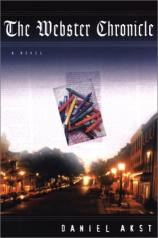Reading Group Guide
Discussion Questions
The Webster Chronicle

1. In The Webster Chronicle, it is unclear whether Belinda Jackson is telling the whole truth about the reason for her daughter's death in the car wreck. Is her daughter's confession of child abuse the real reason for Belinda's crash, or was she just another drunk driver who killed an innocent person?
2. Since the first allegations of child abuse at Alphabet Soup came from Belinda Jackson and Lucille Lyttle, the first of which killed her daughter while driving drunk, and the second of which is an alcoholic who is loyal to Belinda, what are your first reactions to these allegations? Especially considering the conflicting evidence which might support allegations of child abuse: that Frank and Emily Joseph lost a child once, that Emily was sexually abused by her uncle when she was little, and that Frank is capable of spanking a child?
3. Terry Mathers's journalistic alter ego, Tartaglia, plays devil's advocate to Terry's other work in the Chronicle. Like Terry, how does Akst's story constantly cause the reader to play devil's advocate and to vacillate back and forth in opinion as well?
4. Aside from the affair between Abigail and Charles Krieger, how else is Terry's livelihood directly connected to Krieger's? How does Krieger's contribute to the growing hysteria of "disclosures"?
5. Does the fact that Frank has an affair with Annette lessen his credibility as an innocent and honest man? What about the situation with Anja? In second-person narration, we find out from Frank that "nothing happened" at Alphabet Soup. Does this declaration close the door on the possibility that Frank is a child molester?
6. The Webster Chronicle explores the ways in which a child's sense of reality is largely created by his or her parents. But how does The Chronicle also contribute to the eventual hysteria that takes place in Webster?
7. Each of the illicit sexual affairs in The Webster Chronicle complicates the situation at Alphabet Soup in some way. Using Julie/Chris, Abigail/Charles, and Terry/Diana, explain.
8. In many ways, Akst instills in the reader the same skepticism, gullibility, and shifts in perception that occur within the characters in the novel. For example, Detective Jepson and Julie seem in the beginning of the investigations to be a virtuous family man and a closet Satan-worshipper, respectively, but by the end of the novel, their images change. Julie becomes an innocent victim of the fever of "disclosures" about child abuse, while Jepson morphs into a sort of McCarthy figure, driving giddily around town, pointing at potential child abusers and also being accused of assault himself by Diana. What do you think Akst might be saying about how we can influence our own perception? If children get their sense of reality from their parents, where do adults get their reality from? In other words, what informs the "truth", the search for which is at the center of the novel?
9. Do you think Terry's devotion to rectifying the damage his articles caused is sufficient penance, considering the terrible things that befall Jesus, Albertson, Pearl, and the other innocent Alphabet Soup employees? Can he now consider himself "successful", just as he once considered his father? How does Terry's view of success change by the end of the novel?
The Webster Chronicle
- Publication Date: January 1, 2001
- Genres: Fiction
- Hardcover: 311 pages
- Publisher: Bluehen Books
- ISBN-10: 0399148124
- ISBN-13: 9780399148125







